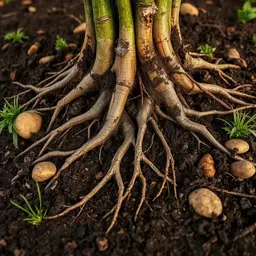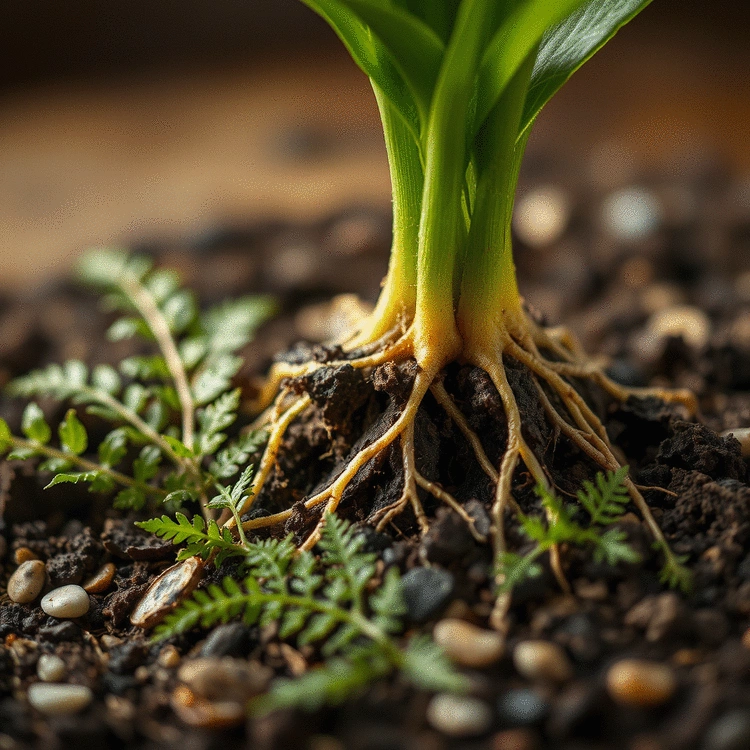
- Root Care
- Aug 24
2025-07-08
In a world where sustainability matters more than ever, understanding the hidden power of healthy root systems can significantly enhance your gardening practices. By focusing on organic methods, you can create a flourishing ecosystem that not only benefits your plants but also the environment.
Encouraging strong root systems leads to several benefits in gardening. Below are key advantages represented visually, which you can further explore in our guide on essential tree care and landscaping:
Well-developed roots absorb vital nutrients, promoting overall plant health.
Deep roots help plants survive dry spells by reaching for underground water sources.
A robust root network secures plants in the soil, reducing the risk of toppling over.
As a horticulturist, I’ve come to appreciate the fascinating world of roots and their vital role in a plant's health. Healthy root systems are essential for plants to absorb water and nutrients, anchoring them firmly in the soil as they reach for the sky. When we focus on promoting healthy roots, we’re vastly improving a plant's ability to thrive in its environment, making organic methods a crucial aspect of sustainable gardening.
By using organic methods, we not only nurture these hidden networks but also enhance the overall ecosystem of our gardens. For instance, the soil becomes a vibrant habitat for beneficial microorganisms, which ultimately strengthens the relationship between plants and their surroundings. This is where the beauty of organic gardening shines—encouraging roots naturally leads to a flourishing garden!
Encouraging strong root systems leads to several benefits that can transform your gardening experience. Strong roots allow plants to access nutrients more efficiently, which enhances their growth and resilience. This is especially important during times of drought or stress, where a deep root system can tap into moisture reserves that are otherwise inaccessible, a concept central to deep roots for stable trees.
As I’ve often seen in my own gardening journey, the vitality of a plant above ground is directly linked to the strength of its roots below. When we nurture these roots, we cultivate not just plants, but a healthy ecosystem within our gardens.
Now that we understand the significance of root systems, let’s explore some organic techniques to promote root growth. These methods are gentle on the environment and can lead to healthier plants over time. From composting to organic fertilizers, each technique plays a role in enriching the soil and supporting roots.
By incorporating these techniques into our gardening practices, we pave the way for a thriving plant ecosystem, ensuring that our roots are nurtured in the best possible way. As we journey together through the world of horticulture, let’s embrace these organic methods to celebrate the beauty of nature!
Here's a brief recap of the key points discussed so far:
Organic gardening isn't just a trend—it's a powerful way to nurture our plants and the environment. At Deep Roots Journal, we believe that healthy root systems can transform your garden into a thriving ecosystem. By embracing organic practices, you can enhance the foundation of your plants, leading to better growth, resilience, and overall health.
The impact of organic methods on root growth is profound. Techniques like using compost, mycorrhizal fungi, and natural fertilizers foster rich soil that supports vibrant root networks. It's not merely about what you see above ground; the true magic happens in the soil, where roots develop strength and adaptability. This understanding is crucial for any gardener aiming to cultivate a sustainable garden, as highlighted in our discussion on enhancing roots with natural fertilizers.
As we wrap up our exploration, let's highlight some key takeaways for encouraging robust root systems through organic practices:
By focusing on these techniques, you’ll not only support individual plants but also contribute to a healthier garden ecosystem. Remember, every small change makes a big difference!
Embracing organic methods is about more than just gardening; it's about creating a sustainable approach to our relationship with nature. By adopting chemical-free techniques, we not only protect our plants but also safeguard our soil and water resources. It's a win-win situation for both gardeners and the environment!
At Deep Roots Journal, our mission is to inspire fellow gardening enthusiasts to ditch the chemicals and embrace sustainable practices. By doing so, you are not only nurturing your garden but also contributing positively to the ecosystem. Every step you take towards organic gardening is a step towards a healthier planet!
Now that you have a better understanding of the benefits and techniques for organic root growth, it’s time to put this knowledge into action! Here are a few steps you can take:
I encourage you to experiment with these techniques and observe how they transform your garden. Let’s work together to foster a thriving natural environment, not just for ourselves but for future generations as well! For more in-depth information, consider exploring resources on encouraging healthy root development.
Here is a quick recap of the important points discussed in the article:
